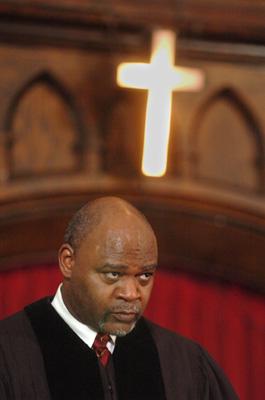Reverend Kenneth Reed, pastor at the Gospel Temple Church of God and the president of the Interdenominational Ministerial Alliance, has played an active role in the Syracuse area as a pastor for the more than fifteen years. Just recently, Reed was informed along with several other faith-based groups on Syracuse’s South Side that they would be receiving $750,000 dollars over the next three years to help those families afflicted from the constant violence and multiply struggles faced in the area (Sieh). Even more recently, and more applicable, was the seminar held at Reverend Reed’s church in September of 2007 on HIV/AIDS outreach in the area. The Gospel Temple Church of God is located on 571 Oakwood Ave., interestingly enough right across the road on the southern border of Pioneer Homes. Sammy Summers, community relations specialist with the FACES program (Fighting AIDS and HIV Through Case Management, Education, and Support), stated “Many blacks with HIV/AIDS are so ashamed they don’t seek medical attention until it’s too late.” (Mulder). This stigmatization of HIV/AIDS is a major setback when it comes to seeking medical attention, telling a partner of ones seropositive status, or even divulging ones status to family members. With this stigma in mind, it is necessary to examine several case studies of the subject before theorizing another solution.
Reverend Reed
A recent study from Syracuse University examined the impact of HIV-related stigmatization among HIV-positive men and women. Cited in the study were facts from the December 1, 2000 issue of MMWR, where an internet based survey of 5641 respondents were asked multiple questions regarding HIV infected individuals. The study found that 40.2% of the respondents believed HIV could be transmitted through sharing a glass or being coughed or sneezed upon by an HIV infected individual. These respondents also believed that those infected “got what they deserved” (MMWR). In the Syracuse study, 221 participants, comprised of 46% white, 42% African American, and 12% of another ethnicity, were asked five questions regarding the stigma of being HIV infected. To summarize the results, 41% of participants answered that others acted negatively towards them once they learned of their HIV positive status, 29% felt avoided once others learned of their status, and nearly 20% found they were excluded from social events once their HIV status was exposed (Vanable). It seems obvious that people would be afraid to be tested for HIV and receive treatment when there is such a negative experience associated with friends and family finding out about one’s disease. The second solution deals in part with combating this stigma.
Picture Taken From:http://www.syracuse.com/news/updates/index.ssf?/mtlogs/syr_poststandard/archives/2006_02.html
